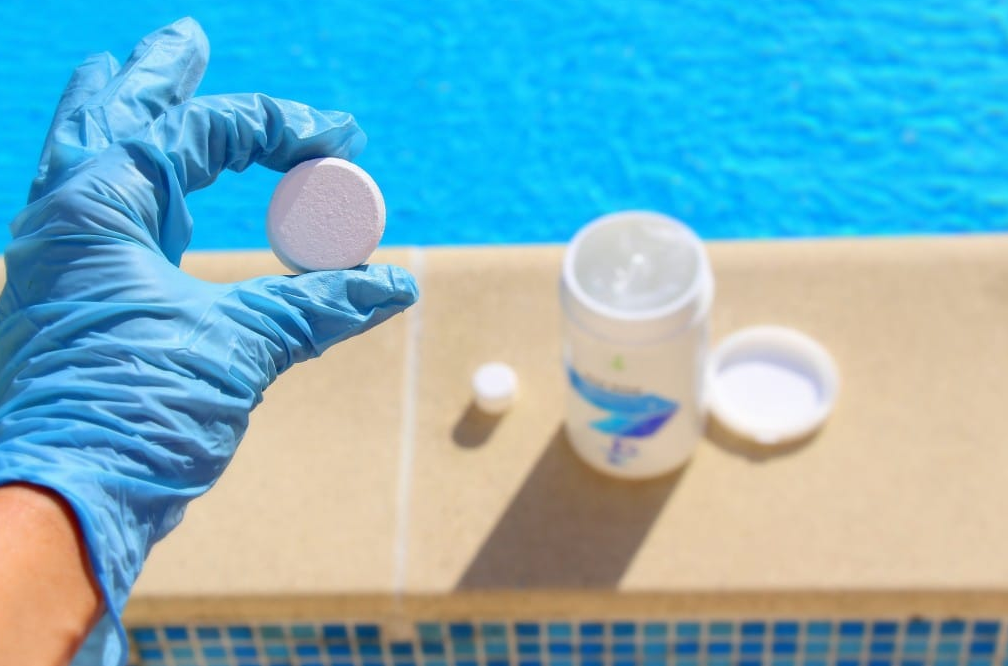Taking a dip in a refreshing saltwater pool sounds like a dream escape, but for some, a lingering concern hangs in the air: can saltwater pools raise your blood pressure? This question, particularly if you have existing hypertension concerns, warrants a closer look.
Let’s dive into the science behind saltwater pools and their potential impact on blood pressure, debunking myths and equipping you with accurate information to make informed choices about your next swim.
Understanding Saltwater Pools and Chlorine Alternatives
Saltwater pools, also known as saline pools, utilize a chlorine generation system that converts salt into chlorine through electrolysis. This method offers several advantages over traditional chlorine pools, including:
- Reduced chemical usage: Saltwater systems require significantly less chlorine, minimizing exposure to harsh chemicals and their associated side effects like skin irritation and eye sting.
- Softer, gentler on skin and hair: The lower chlorine levels translate to gentler water, leaving your skin feeling soft and your hair less prone to dryness.
- Less irritating for sensitive individuals: Those with allergies or sensitivities to chlorine might find saltwater pools a more comfortable option.
However, the presence of salt, even at lower levels, ignites the question: can it affect blood pressure?
Debunking the Myth: Saltwater Pools and Blood Pressure
The good news is, that current scientific evidence does not indicate a direct link between swimming in saltwater pools and elevated blood pressure. The salt concentration in these pools is significantly lower than seawater, and absorption through the skin is minimal.
Here’s why:
- Skin acts as a barrier: Our skin is remarkably adept at regulating what enters and exits our bodies. While water and some minerals can passively diffuse through the epidermis, the outer layer, sodium (the key component of salt) is not readily absorbed in significant amounts.
- Low salt concentration: Saltwater pools typically have salt concentrations around 3,000 ppm (parts per million), compared to seawater’s 35,000 ppm. This lower concentration further minimizes the potential for absorption.
- Minimal ingestion: Unless deliberately swallowing pool water, incidental intake during swimming is negligible and unlikely to affect blood pressure.
Therefore, for most individuals, including those with existing hypertension, swimming in saltwater pools is generally considered safe and unlikely to contribute to blood pressure fluctuations.

Factors to Consider for Individuals with Hypertension
While the direct impact of saltwater on blood pressure appears minimal, individuals with hypertension should still exercise caution and consider these factors:
- Underlying conditions: Consult your doctor if you have any underlying cardiovascular conditions or are on blood pressure medication before swimming in any pool, regardless of type.
- Duration and intensity of swimming: Strenuous exercise, including swimming, can temporarily raise blood pressure. Listen to your body, take breaks, and avoid overexertion.
- Hydration: Proper hydration is crucial for anyone, but especially for individuals with hypertension. Drink plenty of water before, during, and after swimming to maintain electrolyte balance.
- Monitor your blood pressure: If you have concerns, monitor your blood pressure before and after swimming in a saltwater pool to track any potential changes.
Always prioritize your health and consult your doctor for personalized guidance if you have any concerns about swimming and your blood pressure.
Benefits of Swimming and Fitness
The health benefits of swimming extend far beyond the pool’s salinity. Swimming is a low-impact, full-body workout that offers numerous advantages, including:
- Cardiovascular health: Swimming strengthens the heart, improves lung function, and increases blood flow, contributing to overall cardiovascular health.
- Muscle and joint health: The buoyancy of water reduces stress on joints while engaging various muscle groups, leading to improved strength and flexibility.
- Stress reduction: The rhythmic nature of swimming and the calming environment of the pool can be powerful stress relievers, promoting mental well-being.
- Weight management: Swimming burns calories effectively, aiding in weight management or maintenance.
So, whether you choose a saltwater or freshwater pool, prioritize the joy of movement and the myriad health benefits of swimming.
Exploring the Nuances of Saltwater Pools & Blood Pressure
While we’ve established that the direct link between saltwater pools and elevated blood pressure is largely a myth, there are still some nuances to consider for a truly informed dip. Let’s take a deeper dive into these factors:
Individual Variations
Everyone’s physiology and sensitivity to salt differ. Individuals with pre-existing hypertension or salt sensitivity might experience slightly higher blood pressure spikes after swimming in saltwater pools compared to healthy individuals. However, these spikes are typically temporary and within a safe range.
READ: Can You Take Collagen with High Blood Pressure Medication?
Pool Maintenance and Salt Levels
Saltwater pool maintenance plays a crucial role. Improper sanitation can lead to higher chlorine production, negating the gentler benefits of saltwater and potentially irritating the skin. Ensure the pool maintains optimal salt levels (around 3,000 ppm) and proper sanitation practices.
Exercise Intensity and Duration
As mentioned earlier, strenuous exercise, including swimming, can temporarily raise blood pressure. This applies to all pools, not just saltwater. Monitor your exertion levels, take breaks, and adjust your swim intensity based on your fitness level and health recommendations.
Hydration and Electrolyte Balance
Staying hydrated is crucial, especially during physical activity like swimming. Proper hydration helps regulate electrolytes, including sodium, and prevents dehydration-related blood pressure fluctuations. Drink plenty of water before, during, and after swimming to maintain balance.
Alternative Pool Options
If you have persistent concerns about saltwater pools, consider alternative options like freshwater pools with ozone or ultraviolet (UV) sanitation systems. These methods offer gentle water without chlorine or salt, providing peace of mind for individuals with specific sensitivities.

Remember: Consultation with your doctor is key if you have any underlying health conditions or concerns about swimming and blood pressure. They can provide personalized guidance based on your unique needs and medical history.
Beyond the Blood Pressure Buzz
Now that we’ve addressed the blood pressure concerns, let’s broaden our perspective and explore the numerous benefits of swimming, regardless of pool type:
Cardiovascular Champion
Swimming is a fantastic cardiovascular workout. It strengthens the heart, improves lung function, and increases blood flow, promoting overall cardiovascular health and reducing the risk of heart disease.
Joint-Friendly Fitness
The buoyancy of the water takes the pressure off your joints, making swimming a low-impact exercise suitable for individuals with joint pain or limitations. It strengthens muscles while minimizing stress on bones and joints, improving flexibility and mobility.
Stress-Busting Bliss
The rhythmic nature of swimming and the calming environment of the pool can be powerful stress relievers. Immersing yourself in the water can lower cortisol levels, the stress hormone, and promote relaxation, improving mental well-being and reducing anxiety.

Calorie-Torching Powerhouse
Swimming burns calories effectively, making it a valuable tool for weight management or maintenance. Different strokes engage various muscle groups, maximizing calorie expenditure and contributing to a healthy metabolic rate.
A Gateway to a Healthier You
Swimming is not just about physical benefits; it also fosters a sense of accomplishment and enjoyment. It can be a social activity, a meditative practice, or simply a refreshing way to move your body. Let swimming be your gateway to a healthier, happier you, regardless of the pool’s salinity.
Conclusion: Take the Plunge Without Worry
Swimming in a saltwater pool can be a refreshing and rejuvenating experience, regardless of your blood pressure concerns. The science suggests minimal impact on blood pressure, and the overall health benefits of swimming outweigh potential worries.
Listen to your body, consult your doctor if necessary, and enjoy the invigorating feeling of gliding through the water – saltwater or not. After all, a healthy, balanced lifestyle is the key to well-being, and swimming offers a fantastic contribution to that journey.
Resources & References
- The Centers for Disease Control and Prevention (CDC): https://www.cdc.gov/healthywater/swimming/index.html
- The Mayo Clinic: https://mcpress.mayoclinic.org/healthy-heart/chapter-4-what-the-numbers-mean/
- The American Heart Association: https://www.heart.org/
FAQs – Saltwater Pools & Blood Pressure
Can swimming in a saltwater pool raise my blood pressure?
No, current scientific evidence does not support a direct link between saltwater pools and elevated blood pressure for most individuals. The salt concentration is significantly lower than seawater, and absorption through the skin is minimal. However, if you have pre-existing hypertension or salt sensitivity, consult your doctor before swimming and monitor your blood pressure to address any potential concerns.
Should I avoid saltwater pools if I have high blood pressure?
Generally, no. Unless your doctor advises otherwise due to specific health conditions, swimming in a saltwater pool is safe for most individuals with hypertension. However, prioritize listening to your body, staying hydrated, and avoiding overexertion to ensure a safe and enjoyable experience.
What are the benefits of swimming for blood pressure?
Swimming, regardless of pool type, offers numerous benefits for blood pressure. It is a low-impact, full-body workout that strengthens the heart, improves circulation, and helps manage weight, all of which contribute to lowering blood pressure over time.
Are there alternative pool options for individuals with blood pressure concerns?
Yes, if saltwater pools raise any concerns, you can explore freshwater pools with ozone or UV sanitation systems. These methods offer gentle water without chlorine or salt, providing peace of mind for individuals with specific sensitivities.
What steps can I take to minimize any potential blood pressure impact from swimming?
- Consult your doctor: Before starting any new exercise program, including swimming, especially if you have high blood pressure, consult your doctor for personalized advice.
- Hydrate: Drink plenty of water before, during, and after swimming to maintain electrolyte balance and prevent dehydration.
- Monitor your intensity: Start slowly and gradually increase your swimming intensity as your fitness improves. Avoid overexertion, which can temporarily raise blood pressure.
- Listen to your body: Take breaks when needed and pay attention to how you feel during and after swimming. If you experience any dizziness, lightheadedness, or discomfort, stop immediately and consult your doctor.
Where can I find more information about saltwater pools and their health effects?
Several reputable sources offer information about saltwater pools and their health effects. You can consult websites like the Centers for Disease Control and Prevention (CDC), the Mayo Clinic, and the American Heart Association. Additionally, talking to your doctor or a qualified pool expert can provide valuable insights specific to your needs and concerns.


